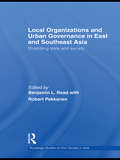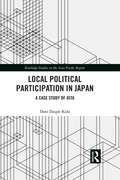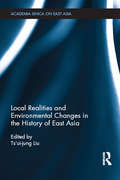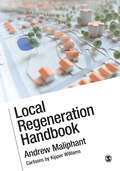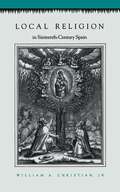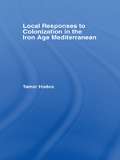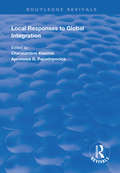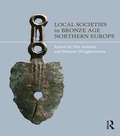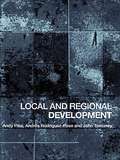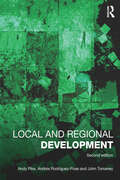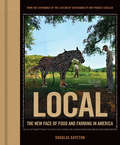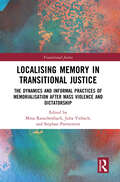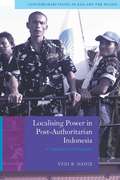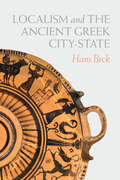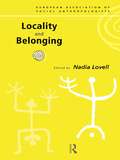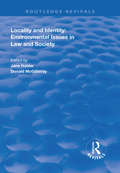- Table View
- List View
Local Organizations For Social Development: Concepts And Cases Of Irrigation Organization
by David M FreemanOriginally published in 1989. This study is based on field research at the Niazberg site in Pakistan, a small tank system in Madhya Pradesh, India and two tanks systems located in the Sri Lankan Dry Zone
Local Organizations and Urban Governance in East and Southeast Asia: Straddling state and society (Routledge Studies on Civil Society in Asia)
by Benjamin L. Read Robert PekkanenThis edited collection brings together enterprising pieces of new research on the many forms of organization in East and Southeast Asia that are sponsored or mandated by government, but engage widespread participation at the grassroots level. Straddling the state-society divide, these organizations play important roles in society and politics, yet remain only dimly understood. This book shines a spotlight on this phenomenon, which speaks to fundamental questions about how such societies choose to organize themselves, how institutions of local governance change over time, and how individuals respond to and make use of the power of the state. The contributors investigate organizations ranging from volunteer-based organizations that partner with government in providing services for homeless children, to state-managed networks of neighborhood- or village-level associations that perform representative as well as administrative functions and seeks to answer a number of questions: When do the "vertical," top-down imperatives of the state stifle "horizontal" solidarities, and when might the two work in harmony? Are useful social and administrative purposes served by this type of fusion? Does it amplify or merely muffle citizens’ voices? What does it tell us about existing accounts of community, social capital, "synergy," "complementarity," "subsidiarity," and related concepts? Representing seven countries: China, Japan, Vietnam, Thailand, Indonesia, Taiwan, and Singapore this volume will be of interest to undergraduates, postgraduates and academics in Asian studies, political science, sociology, anthropology, development, history, nonprofit studies.
Local Parties In Political And Organizational Perspective
by Martin R. SaizAnalyzes relations between political party systems and local communities in the United States, Canada, Great Britain, Germany, Italy, and other nations. This book addresses an almost completely neglected branch of community politics: the comparative analysis of local political systems. Accordingly, Local Parties in Political and Organizational Perspective opens new views to a variety of relations between political systems and local communities in the United States, Canada, Great Britain, Italy, Germany, and other nations. The authors unite specific national case studies with an original theoretical framework, resulting in an anthology with uncommon coherency. Theoretical generalizations are tested with cross-national data; each case study, in turn, demonstrates a localized version of the larger framework, using specific historical political outcomes as examples. This book addresses an almost completely neglected branch of community politics: the comparative analysis of local political systems. Accordingly, Local Parties in Political and Organizational Perspective opens new views to a variety of relations between political systems and local communities in the United States, Canada, Great Britain, Italy, Germany, and other nations. The authors unite specific national case studies with an original theoretical framework, resulting in an anthology with uncommon coherency. Theoretical generalizations are tested with cross-national data; each case study, in turn, demonstrates a localized version of the larger framework, using specific historical political outcomes as examples. Local Parties in Political and Organizational Perspective argues that local political parties should be understood as Janus-faced: components of nationally encompassing organizations on the one hand, and specific actors in community politics on the other. As such, local parties necessarily act as the primary democratic institutions that link ordinary citizens to local governmental institutions, and transitively to the national political system. By linking ordinary citizens and the most basic local organizations with national politics, Local Parties in Political and Organizational Perspective adds significantly to the collective understanding of the nature and status of local parties in mature and developing democracies
Local Planning In Practice
by Michael Bruton David Nicholson"First Published in 1991, Routledge is an imprint of Taylor & Francis, an informa company."
Local Political Participation in Japan: A Case Study of Oita (Routledge Studies on the Asia-Pacific Region)
by Dani Daigle KidaHow Do Japanese Citizens Participate Politically? Most Japanese citizens, perhaps with a bit of a chuckle, would answer that ‘average’ Japanese do not participate in politics. While political attitudes in other countries have fluctuated corresponding to social, political, and economic climates of the times; in Japan, a consistently negative view of politics has persisted since the late 1960s. Japanese citizens perceive their government much more critically than citizens of neighboring countries. While many Japanese citizens participate in specific political acts such as signing candidate support cards, attending political rallies, or directly contacting politicians, they largely do not view these activities as political participation. Kida examines why this is the case; whether there is a connection between negative views of politics and how Japanese people self-identify their political participation; how Japanese citizens attempt to exact change or influence policy; how the government engages citizens in political participation; and the relationship between citizens’ attitudes towards government and levels of political participation. Kida explores political participation on the local level, to better understand the sources of political attitudes. While participation studies have been conducted in Japan, most are centered in large urban areas, focusing on either extreme forms of participation such as protests, or concentrated on single issue participation such as the environmental or women’s movements. This book, in contrast, explores what every day ‘regular’ in the system political participation looks like in a small traditional Japanese city – using Oita, a small city in Kyushu, as a case study. It focuses especially on the role local institutions and politicians play in influencing the kinds of participation available and subsequently, the attitudes created about participation.
Local Politics And Development In The Middle East
by Louis J. Cantori Iliya HarikAlthough development at the local level is a primary goal of most assistance schemes, most development agencies and banks know little of politics at the local level in developing countries. As a result, assistance programs generally lack relevance to indigenous populations and are--at the community level--viewed as being controlled from the "outside." The authors of this book concentrate on how local politics influence development in the Middle East, with the intent of encouraging more appropriate--and thus more effective--assistance programs. They discuss general policy issues and the nature of center-periphery relations in Middle East countries and delve into specific problems encountered in Egypt, Jordan, Lebanon, Syria, Iraq, Turkey, Tunisia, and North Yemen, showing how information about local political schemes can aid administrators of development programs in providing assistance that is acceptable--and accepted--at the local level. The case studies provide a broad base for planning, encompassing capitalist, state capitalist, and socialist systems in both rural and urban settings.
Local Politics and Democratization in Russia (BASEES/Routledge Series on Russian and East European Studies)
by Cameron RossThis comprehensive study of local politics in Russia shows that the key reforms of local government, and the struggle to forge viable grassroots democracies have been inextricably linked to the wider struggle for power between the regions and the Kremlin, and to the specific nature of Russia’s highly politicized and negotiated form of asymmetrical federalism. During the Yeltsin era all attempts to create a universal and uniform system of local-self-government in the federation were a failure. Under the protection of their constitutions and charters, and the extra-constitutional rights and powers granted to them in special bilateral treaties, regional leaders, particularly in Russia’s 21 ethnic republics were able to instigate highly authoritarian regimes and to thwart the implementation key local government reforms. Thus, by the end of the Yeltsin era the number of municipalities, their type, status and powers, varied tremendously from region to region. Putin’s local government reforms also need to be viewed as an integral component of his wider centralizing political agenda, and his assault on the principles and practices of federalism. With the instigation of his ‘dictatorship of law’ and ‘power vertical’, Putin has thwarted the development of grassroots democracy and overseen the creation of local ‘electoral authoritarian’ regimes. Putin’s new system of local self-government marks a victory for the proponents of the ‘statist concept’ of local self-government over those who championed the ‘societal concept’, codified in Article 12 of the Russian Constitution. Overall, this book is an important resource for anyone seeking to understand politics in Putin’s Russia.
Local Politics in Indonesia: Pathways to Power (Routledge Contemporary Southeast Asia Series)
by Nankyung ChoiCompetitive elections have become an institutionalized feature of contemporary Indonesia’s politics. This, together with other considerations, makes it reasonable to call Indonesia the world’s third largest democracy. Nonetheless, democratic elections in Indonesia are both more complex and interesting than is commonly understood. This book explores how local elections in Indonesia have affected the development and dynamics of Indonesia’s fledgling democracy. Based on fine-grained analyses of elections in five localities, the book shows how Indonesia’s transition to direct elections of local government executives has transformed party politics and elite development at local levels of governance. Employing the methods of political anthropology and informed by a critical reading of theories of democracy and decentralization, the book presents detailed analyses of elections in five localities across four Indonesian provinces. The book calls attention to the ambiguous relation between formal democratic reforms and political behavior. It illustrates how local elite politics has evolved within the context of political and administrative reforms, whose announced goals are to improve the representativeness and responsiveness of political institutions. This book provides a window onto local political processes that will be of interest to students and scholars of politics in Southeast Asia and beyond.
Local Radio, Going Global
by Guy StarkeyAn examination of the development of local radio broadcasting and the trend for locally-owned, locally-originated and locally-accountable commercial radio stations to fall into the hands of national and international media groups. Starkey traces the early development of local radio through to present-day digital environments.
Local Realities and Environmental Changes in the History of East Asia (Academia Sinica on East Asia)
by Ts'Ui-Jung LiuEnvironmental history has evolved into a well-established historical subfield which has broadened the horizons of historical research, beyond human affairs, to include the study of human interactions with natural and man-made environments. This broadened scope has attracted scholars from many different fields; a development which is reflected by this volume as it highlights the recent studies on East Asian environmental history by scholars of History, Economic History, Political ecology, Sociology and Environmental Studies. <P><P>This book examines the local realities and environmental changes in East Asia, and is one of a few publications in English on the subject. Contributors apply rich historical material, maps and statistical data to reveal the local environmental realities infused by global perspectives. Part I deals with attitude toward nature, focusing on the soundscape conceived by traditional Chinese literati and on "industrious revolution" in Tokugawa Japan. Part II includes four case studies which respectively discuss the hydraulic management and political ecology in the Yongle reign (1403-1424), the "Woosung Bar" controversy in the 1870s, the expansion of Daihaizi Reservoir in Xinjiang in the 1950s, and interactions between the indigenous communities and NGOs in Hualien, Taiwan. Part III presents case studies of Japan dealing with natural disasters: volcano eruption, floods, and the human actions around Tokyo since the eighteenth century. These chapters and the insights they offer provide the reader with the most recent research on East Asian environmental history. <P><P>Covering the geographical areas of Japan, North and Northwest China, the Lower Yangzi Delta and Taiwan, and the timeframe spanning the seventh century BC to the present day, the book will be of great interest to anyone studying the history of East Asia, environmental history or environmental studies.
Local Regeneration Handbook
by Andrew MaliphantLocal regeneration, and action on local issues, is fundamental to the sustainability of local communities. This is especially the case in the UK, with the Government focus on such approaches as Local Enterprise Partnerships and neighbourhood development plans, and further devolution proposals in the pipeline. The Local Regeneration Handbook meets the needs of today's practising “regeneration workers”, broadly including anyone from regeneration partnership or development project officers to housing association neighbourhood officers, parish councillors, or other active local citizens, who all share a concern for the wellbeing of the community where they live or work, and a need to work with others for the best possible future for that community. Containing practical advice, templates, and real-life case studies for different stages in local regeneration, including fundraising, partnership development and project management, as well as support for personal development, and illustrations of key points by cartoonist Kipper Williams, this is an essential guide for anyone in local regeneration.
Local Regeneration Handbook
by Andrew MaliphantLocal regeneration, and action on local issues, is fundamental to the sustainability of local communities. This is especially the case in the UK, with the Government focus on such approaches as Local Enterprise Partnerships and neighbourhood development plans, and further devolution proposals in the pipeline. The Local Regeneration Handbook meets the needs of today′s practising "regeneration workers", broadly including anyone from regeneration partnership or development project officers to housing association neighbourhood officers, parish councillors, or other active local citizens, who all share a concern for the wellbeing of the community where they live or work, and a need to work with others for the best possible future for that community. Containing practical advice, templates, and real-life case studies for different stages in local regeneration, including fundraising, partnership development and project management, as well as support for personal development, and illustrations of key points by cartoonist Kipper Williams, this is an essential guide for anyone in local regeneration.
Local Religion in Sixteenth-Century Spain
by William A. ChristianThe description for this book, Local Religion in Sixteenth-Century Spain, will be forthcoming.
Local Responses to Colonization in the Iron Age Meditarranean
by Tamar HodosFrom North Syria to Sicily and North Africa, this is the first study to bring together such a breadth of data, and compares responses to colonization in the Iron-Age Mediterranean.
Local Responses to Global Integration: Exploring The Socioeconomic Aspects Of Rural Restructuring (Routledge Revivals)
by Apostolos G. Papadopoulos Charalambos KasimisFirst published in 1999, this volume features articles from 19 contributors on local responses to global integration, with a focus on rural areas and their adoption of new functions as both producers and consumers. It responds to a crisis in the regulatory framework and reconsiders globality, revealing new forms of production and consumption developing in diverse ways amongst these global rural communities. Authors from Australia, Bulgaria, Finland, Greece, Ireland, the Netherlands, Poland, Sweden, the United Kingdom and Venezuela are represented.
Local Societies in Bronze Age Northern Europe
by Nils Anfinset Melanie WrigglesworthThis book aims to understand the process of the Bronze Age societies of Northern Europe which are often regarded as the periphery and a bleak contrast to the Central European Bronze Age. The Bronze Age is the first "globalised" period with new types of societies and new modes of exchange and trade. In this context there is considerable local variation and diversity within the Bronze Age societies of Northern Europe which is poorly understood, although there have been advances and changes in this research. Therefore this book challenges some of the mainstream opinions on the Bronze Age of Northern Europe, and focus on local and regional aspects. This is done by a series of articles from significant contributors that deal with these issues on theoretical and empirical levels, with regards to differences, cultural dualism, boundaries, regions and regionality in a period of increased "globalisation". The result is a movement away from local and regional aspects toward communications, travels and contacts between northern Europe and the greater world, not only towards Central Europe and the Near East but also towards the east. Northern/Arctic Europe is often left out in these discussions, and this book will contribute to this greater picture of the Bronze Age world.
Local Vino: The Winery Boom in the Heartland
by James R PennellThe art and craft of winemaking has put down roots in Middle America, where enterprising vintners coax reds and whites from the prairie earth while their businesses stand at the hub of a new tradition of community and conviviality. James R. Pennell tracks among the hardy vines and heartland terroir of wineries across Illinois, Iowa, Indiana, and Ohio. Blending history and observation, Pennell gives us a ground-up view of the business from cuttings and cultivation to sales and marketing. He also invites entrepreneurs to share stories of their ambitions, hard work, and strategies. Together, author and subjects trace the hows and whys of progress toward that noblest of goals: a great vintage that puts their winery on the map.
Local and Regional Development
by Andy Pike Andrés Rodriguez-Pose John Tomaney Andres Rodriguez-PoseLocal and regional development is an increasingly global issue. For localities and regions, the challenge of enhancing prosperity, improving wellbeing and increasing living standards has become acute for localities and regions formerly considered discrete parts of the ‘developed’ and ‘developing’ worlds. Amid concern over the definitions and sustainability of ‘development’, a spectre has emerged of deepened unevenness and sharpened inequalities in the development prospects for particular social groups and territories. Local and Regional Development engages and addresses the key questions: what are the principles and values that shape definitions and strategies of local and regional development? What are the conceptual and theoretical frameworks capable of understanding and interpreting local and regional development? What are the main policy interventions and instruments? How do localities and regions attempt to effect development in practice? What kinds of local and regional development should we be pursuing? This book addresses the fundamental issues of ‘what kind of local and regional development and for whom?’, frameworks of understanding, and instruments and policies. It outlines what a holistic, progressive and sustainable local and regional development might constitute before reflecting on its limits and political renewal. With the growing international importance of local and regional development, this book is an essential student purchase, illustrated throughout with maps, figures and case studies from Asia, Europe, and Central and North America.
Local and Regional Development
by Andy Pike Andrés Rodriguez-Pose John TomaneyActors and institutions in localities and regions across the world are seeking prosperity and well-being amidst tumultuous and disruptive shifts and transitions generated by: an increasingly globalised, knowledge-intensive capitalism; global financial instability, volatility and crisis; concerns about economic, social and ecological sustainability, climate change and resource shortages; new multi-actor and multi-level systems of government and governance and a re-ordering of the international political economy; state austerity and retrenchment; and, new and reformed approaches to intervention, policy and institutions for local and regional development. Local and Regional Development provides an accessible, critical and integrated examination of local and regional development theory, institutions and policy in this changing context. Amidst its rising importance, the book addresses the fundamental issues of ‘what kind of local and regional development and for whom?’, its purposes, principles and values, frameworks of understanding, approaches and interventions, and integrated approaches to local and regional development throughout the world. The approach provides a theoretically informed, critical analysis of contemporary local and regional development in an international and multi-disciplinary context, grounded in concrete empirical analysis from experiences in the global North and South. It concludes by identifying what might constitute holistic, inclusive, progressive and sustainable local and regional development, and reflecting upon its limits and political renewal.
Local: The New Face of Food and Farming in America
by Douglas GayetonCombining stunning visuals with insights and a lexicon of more than 200 agricultural terms explained by today’s thought leaders, Local showcases and explores one of the most popular environmental trends: rebuilding local food movements.When Douglas Gayeton took his young daughter to see the salmon run—a favorite pastime growing up in Northern California—he was devastated to find that a combination of urban sprawl, land mismanagement, and pollution had decimated the fish population.The discovery set Gayeton on a journey in search of sustainable solutions. He traveled the country, photographing and learning the new language of sustainability from today’s foremost practitioners in food and farming, including Alice Waters, Wes Jackson, Carl Safina, Temple Grandin, Paul Stamets, Patrick Holden, Barton Seaver, Vandana Shiva, Dr. Elaine Ingham, and Joel Salatin, as well as everyday farmers, fishermen, and dairy producers.Local: The New Face of Food and Farming blends their insights with stunning collage-like information artworks and Gayeton’s Lexicon of Sustainability, which defines and de-mystifies hundreds of terms like “food miles,” “locavore,” “organic,” “grassfed” and “antibiotic free.” In doing so, Gayeton helps people understand what they mean for their lives. He also includes “eco tips” and other information on how the sustainable movement affects us all every day.Local: The New Face of Food and Farming in America educates, engages, and inspires people to pay closer attention to how they eat, what they buy, and where their responsibility begins for creating a healthier, safer food system in America.
Localising Memory in Transitional Justice: The Dynamics and Informal Practices of Memorialisation after Mass Violence and Dictatorship
by Mina Rauschenbach, Julia Viebach, and Stephan ParmentierThis collection adds to the critical transitional justice scholarship that calls for “transitional justice from below” and that makes visible the complex and oftentimes troubled entanglements between justice endeavours, locality, and memory-making. Broadening this perspective, it explores informal memory practices across various contexts with a focus on their individual and collective dynamics and their intersections, reaching also beyond a conceptualisation of memory as mere symbolic reparation and politics of memory. It seeks to highlight the hidden, unwritten, and multifaceted in today’s memory boom by focusing on the memorialisation practices of communities, activists, families, and survivors. Organising its analytical focal point around the localisation of memory, it offers valuable and new insights on how and under what conditions localised memory practices may contribute to recognition and social transformation, as well as how they may at best be inclusive, or exclusive, of dynamic and diverse memories. Drawing on inter- and multi-disciplinary approaches, this book brings an in-depth and nuanced understanding of local memory practices and the dynamics attached to these in transitional justice contexts. It will be of much interest to students and scholars of memory and genocide studies, peace and conflict studies, transitional justice, sociology, and anthropology.
Localising Power in Post-Authoritarian Indonesia
by Vedi HadizThis book is about how the design of institutional change results in unintended consequences. Many post-authoritarian societies have adopted decentralization-effectively localizing power-as part and parcel of democratization, but also in their efforts to entrench "good governance. " Vedi Hadiz shifts the attention to the accompanying tensions and contradictions that define the terms under which the localization of power actually takes place. In the process, he develops a compelling analysis that ties social and institutional change to the outcomes of social conflict in local arenas of power. Using the case of Indonesia, and comparing it with Thailand and the Philippines, Hadiz seeks to understand the seeming puzzle of how local predatory systems of power remain resilient in the face of international and domestic pressures. Forcefully persuasive and characteristically passionate, Hadiz challenges readers while arguing convincingly that local power and politics still matter greatly in our globalized world.
Localism and the Ancient Greek City-State
by Hans BeckA Greek historian investigates the importance of local identity in the Mediterranean world in a “rare, genuinely original book . . . Highly recommended” (Choice).Much as our modern world is interconnected through global networks, the ancient Greek city-states were a dynamic part of the wider Mediterranean landscape. In Localism and the Ancient Greek World, historian Hans Beck argues that local shifts in politics, religion and culture had a pervasive influence in a world of fast-paced change.Citizens in these communities were deeply concerned with maintaining local identity, commercial freedom, distinct religious cults, and much more. Beyond these cultural identifiers, there lay a deeper concept of the local that guided polis societies in their contact with a rapidly expanding world.Drawing on a staggering range of materials—including texts by both known and obscure writers, numismatics, pottery analysis, and archeological records—Beck develops fine-grained case studies that illustrate the significance of the local experience. Localism and the Ancient Greek City-State builds bridges across disciplines and ideas within the humanities. It highlights the importance of localism not only in the archaeology of the ancient Mediterranean, but also in today’s conversations about globalism, networks, and migration.
Locality and Belonging (European Association of Social Anthropologists)
by Nadia LovellLocality and Belonging provides an international overview of the close relationship between territory and cultural identity. The issue of 'belonging' has long been recognized as crucial to the study of identity within anthropology. Here, contributors from Sweden, Norway, the Netherlands, France and the UK present rigorous case studies of 'belonging' from the UK, South Africa, Argentina, Zanzibar, Amazonia, Indonesia and West Africa. Among the themes explored are:* space, memory and ethnicity* the mnemonic use of objects* mythologies of football and history* use of 'natural features' of the environment* nationhood and post-colonial identity making.
Locality and Identity: Environmental Issues in Law and Society (Routledge Revivals)
by Jane Holder Donald McGillivrayFirst published in 1999, this volume is concerned with how issues of identity and locality – globalization and ethics, valuing the environment, environmental justice and the use of traditional and new legal forms – cross the disciplines of law, ethics, geography, political science and social theory. Necessarily diverse, the collection both explores and confronts the limitations of law that prevent recognition of the relationship between humans and nature.

